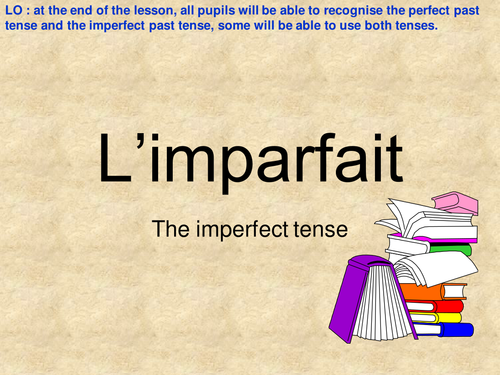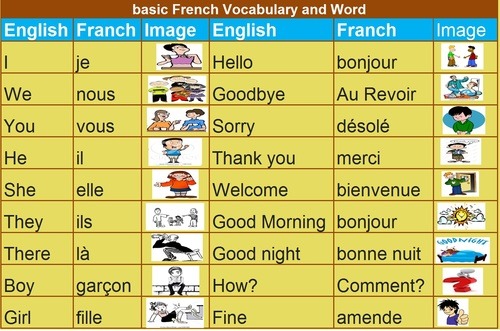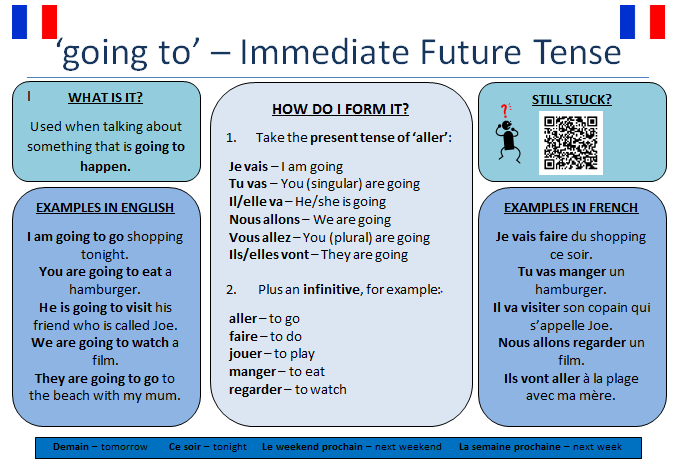Let’s Talk about Family!
 This lesson will give you the vocabulary to do just that. Let’s get started!
This lesson will give you the vocabulary to do just that. Let’s get started!
| IPA |
| family |
la famille |
/la famij/ |
| father |
père |
/pɛʁ/ |
| dad, daddy |
papa |
/papa/ |
| mother |
mère |
/mɛʁ/ |
| mom, mommy, mum |
maman |
/mɑmɑ̃/ |
| parents / relatives |
les parents |
/lɛ paʁɑ̃/ |
| sister |
sœur |
/sɶʁ/ |
| brother |
frère |
/fʁʁ/ |
| siblings |
la fratrie |
/la fʁa.tʁi/ |
| children |
les enfants |
/lɛ‿zɑ̃fɑ̃/ |
| baby |
le bébé |
/lə bebe/ |
| son |
fils |
/fis/ |
| daughter |
fille |
/fij/ |
| husband |
mari |
/maʁi/ |
| husband / male spouse |
époux |
/epu/ |
| wife |
femme |
/fam/ |
| wife / female spouse |
épouse |
/epuz/ |
| grandmother |
grand-mère |
/gʁɑ̃mɛʁ/ |
| grandfather |
grand-père |
/gʁɑ̃pɛʁ/ |
| grandson |
petit-fils |
/pə.ti.fis/ |
| granddaughter |
petite-fille |
/pə.tit.fij |
| uncle |
oncle |
/ɔ̃kl/ |
| aunt |
tante |
/tɑ̃t/ |
| nephew |
neveu |
/nəvø/ |
| niece |
nièce |
/njɛs/ |
| cousin (male) |
cousin |
/kuzɛ̃/ |
| cousin (female) |
cousine |
/kuzin/ |
| stepfather / father-in-law |
beau-père |
/bo.pɛʁ/ |
| stepmother / mother-in-law |
belle-mère |
/bɛl.mɛʁ/ |
| stepbrother / brother-in-law |
beau-frère |
/bo.fʁɛʁ/ |
| stepsister / sister-in-law |
belle-sɶur |
/bɛl.sɶʁ/ |
| half-brother |
demi-frère |
/dəmi.fʁɛʁ/ |
| half-sister |
demi-sɶur |
/dəmisɶʁ/ |
| son-in-law |
gendre (beau-fils) |
/ʒɑ̃dʁ/ (/bo.fi/) |
| daughter-in-law |
bru (belle-fille) |
/bʁy/ (/bɛl.fij/) |
| godfather |
parrain |
/paʁɛ̃/ |
| godmother |
marraine |
/maʁɛn/ |
| godson |
filleul |
/fijɶl/ |
| goddaughter |
filleule |
/fijɶl/ |
Adjectives
| IPA |
| married |
marié(e) |
/maʁje/ |
| single |
célibataire |
/selibatɛʁ/ |
| divorced |
divorcé(e) |
/divɔʁse/ |
| separated |
séparé(e) |
/sepaʁe/ |
| widowed |
veuf/veuve |
/vɶf/, /vɶv/ |
Verbs
| IPA |
| to marry |
marier, épouser |
/maʁje/, /epuze/ |
| to adopt |
adopter |
/adɔpte/ |
Family Trees
Imagine your own family tree. What would it look like?
It may help to imagine a French family to try out some new French vocabulary. While we look at the family imagined here, think of your own and see if any of the new words might apply.The word for family in French is
une famille, (oon fah-mee).

Start with Sandrine. She lives in Bordeaux, in southwest France, with her immediate family.
C’est Sandrine! ‘This is Sandrine’.
She has two parents. The word for parents in French is very similar to our own:
des parents, (day par-ahn).
She has a mother,
une mère, (oon mehr), and a father,
un père, (uhn pehr). In French, you might also hear the familiar forms of these words,
Maman, (Mah-mahn), and
Papa, (Pah-pah).
Her family has four children in it. The word in French for children is
des enfants, (dayz ahn-fahn).
Sandrine has two sisters. The word for sister is
unesœur, (oon sör). She has one brother,
un frère, (uhn frehr). He is the baby,
le bébé, (luh bay-bay).
When we say that Sandrine has two sisters and one brother, it also tells us that her parents have three daughters and one son. The word for daughter is
une fille, (oon fee), and the word for son is
un fils, (uhn fees).

What about your family tree? How is it like Sandrine’s? How is it different?
Let’s practice a tiny bit with this vocabulary, so you can see how you might apply it to yourself.
To say, ‘I have children,’ you would say,
J’ai des enfants.
If you’d like to say, ‘I have a son and a daughter. I also have a sister and a brother,’ you might say,
‘J’ai un fils et une fille. J’ai aussi (also
) une sœur et un frère.’
Notice the expression
J’ai, (jay). It means ‘I have’.
If you like to make it negative (to say you don’t have any), you’ll change it to
je n’ai pas de, (juh nay pah duh) as in,
Je n’ai pas de filles. ‘I don’t have any daughters’.
Extended Family
Let’s add some members to Sandrine’s family. Sandrine’s extended family lives further east, in the Burgundy region.
Sandrine, like many of us, has grandparents. She’s their grandd
aughter.
Let’s see that same idea in French: see if you can find the word for grandparents in the first sentence!
Sandrine a des grand-parents. Sandrine est leur petite-fille.
If you guessed that
des grand-parents, (day grah-pah-rahn), was the French word for grandparents, you were right! She has a grandmother,
une grand-mère, (oon grahn-mehr), and a grandfather,
un grand-père, (uhn grahn-pehr).
The word for granddaughter, as you can see it in the sentence above, is
une petite-fille. For grandson, it’s
unpetit-fils. And for grandchildren, it’s
des petits-enfants, (day puh-teez ahn-fahn).
Sandrine also has aunts, uncles, and cousins. Her favorite aunt is
une tante, (oon tahnt), or
Tata, in the familiar form, as we might say Auntie. Her closest uncle is
un oncle, (uhn ohn-cl), or
Tonton, in the most familiar form. A male cousin is
un cousin, (uhn coo-zan), and a female cousin is
une cousine, (oon coo-zeen).
|
MARITAL STATUS
|
| married |
marié(e) |
| single |
célibataire |
| divorced |
divorcé(e) |
| separated |
separé(e) |
| widowed |
veuf/veuve |
]]>
 This lesson will give you the vocabulary to do just that. Let’s get started!
This lesson will give you the vocabulary to do just that. Let’s get started!
 Start with Sandrine. She lives in Bordeaux, in southwest France, with her immediate family.
C’est Sandrine! ‘This is Sandrine’.
She has two parents. The word for parents in French is very similar to our own: des parents, (day par-ahn).
She has a mother, une mère, (oon mehr), and a father,un père, (uhn pehr). In French, you might also hear the familiar forms of these words, Maman, (Mah-mahn), and Papa, (Pah-pah).
Her family has four children in it. The word in French for children is des enfants, (dayz ahn-fahn).
Sandrine has two sisters. The word for sister is unesœur, (oon sör). She has one brother, un frère, (uhn frehr). He is the baby, le bébé, (luh bay-bay).
When we say that Sandrine has two sisters and one brother, it also tells us that her parents have three daughters and one son. The word for daughter is une fille, (oon fee), and the word for son is un fils, (uhn fees).
Start with Sandrine. She lives in Bordeaux, in southwest France, with her immediate family.
C’est Sandrine! ‘This is Sandrine’.
She has two parents. The word for parents in French is very similar to our own: des parents, (day par-ahn).
She has a mother, une mère, (oon mehr), and a father,un père, (uhn pehr). In French, you might also hear the familiar forms of these words, Maman, (Mah-mahn), and Papa, (Pah-pah).
Her family has four children in it. The word in French for children is des enfants, (dayz ahn-fahn).
Sandrine has two sisters. The word for sister is unesœur, (oon sör). She has one brother, un frère, (uhn frehr). He is the baby, le bébé, (luh bay-bay).
When we say that Sandrine has two sisters and one brother, it also tells us that her parents have three daughters and one son. The word for daughter is une fille, (oon fee), and the word for son is un fils, (uhn fees). What about your family tree? How is it like Sandrine’s? How is it different?
Let’s practice a tiny bit with this vocabulary, so you can see how you might apply it to yourself.
To say, ‘I have children,’ you would say, J’ai des enfants.
If you’d like to say, ‘I have a son and a daughter. I also have a sister and a brother,’ you might say, ‘J’ai un fils et une fille. J’ai aussi (also) une sœur et un frère.’
Notice the expression J’ai, (jay). It means ‘I have’.
If you like to make it negative (to say you don’t have any), you’ll change it to je n’ai pas de, (juh nay pah duh) as in, Je n’ai pas de filles. ‘I don’t have any daughters’.
What about your family tree? How is it like Sandrine’s? How is it different?
Let’s practice a tiny bit with this vocabulary, so you can see how you might apply it to yourself.
To say, ‘I have children,’ you would say, J’ai des enfants.
If you’d like to say, ‘I have a son and a daughter. I also have a sister and a brother,’ you might say, ‘J’ai un fils et une fille. J’ai aussi (also) une sœur et un frère.’
Notice the expression J’ai, (jay). It means ‘I have’.
If you like to make it negative (to say you don’t have any), you’ll change it to je n’ai pas de, (juh nay pah duh) as in, Je n’ai pas de filles. ‘I don’t have any daughters’.





 Spoken French[/caption]
Spoken French[/caption]
 ]]>
]]>
 The Conditional
The conditional is not a tense because it does not refer to a time period. Instead, the conditional is a mood that expresses what a subject would do under certain circumstances.
Use the conditional in the following situations:
The Conditional
The conditional is not a tense because it does not refer to a time period. Instead, the conditional is a mood that expresses what a subject would do under certain circumstances.
Use the conditional in the following situations:
 The conditional uses the same stem as the future tense, but you then add the conditional endings, which are exactly the same as the imperfect endings, as shown in Table 1.
For irregular verbs and verbs with spelling changes, you simply add conditional endings to the stems used for the future.
The conditional uses the same stem as the future tense, but you then add the conditional endings, which are exactly the same as the imperfect endings, as shown in Table 1.
For irregular verbs and verbs with spelling changes, you simply add conditional endings to the stems used for the future.
 Future Tense
The future tense expresses what the subject will do or is going to do in the future. It also describes what action will or is going to take place at a future time.
Although the future tense is usually used for events taking place in the future, the present tense in French may be used to refer to an action that will take place very soon or to ask for future instructions.
Future Tense
The future tense expresses what the subject will do or is going to do in the future. It also describes what action will or is going to take place at a future time.
Although the future tense is usually used for events taking place in the future, the present tense in French may be used to refer to an action that will take place very soon or to ask for future instructions.
 In addition, you can express an imminent action in the near future by conjugating the verb aller (to go) in the present tense and adding the infinitive of the action the speaker will perform. Keep in mind that the irregular present tense of aller is je vais, tu vas, il va, nous allons, vous allez, and ils vont.
In addition, you can express an imminent action in the near future by conjugating the verb aller (to go) in the present tense and adding the infinitive of the action the speaker will perform. Keep in mind that the irregular present tense of aller is je vais, tu vas, il va, nous allons, vous allez, and ils vont.

 Note the following about forming the future tense of regular verbs:
Note the following about forming the future tense of regular verbs:
 For verbs ending in e + consonant + er (but not é + consonant + er), change the silent e before the infinitive ending to è in all forms of the future tense.
For verbs ending in e + consonant + er (but not é + consonant + er), change the silent e before the infinitive ending to è in all forms of the future tense.
 Negating in the future tense
To negate a sentence in the future, simply put ne and the negative word around the conjugated verb:
Negating in the future tense
To negate a sentence in the future, simply put ne and the negative word around the conjugated verb:


 The passé composé, a compound past tense, is formed by combining two elements: when (the action has taken place and, therefore, requires the helping verb avoir) and what (the action that has happened and, therefore, requires the past participle of the regular or irregular verb showing the particular action). See Figure 1.
The passé composé, a compound past tense, is formed by combining two elements: when (the action has taken place and, therefore, requires the helping verb avoir) and what (the action that has happened and, therefore, requires the past participle of the regular or irregular verb showing the particular action). See Figure 1.
 Here are some examples of the passé composé.
Elle a expliqué son problème. (She explained her problem.)
Ils ont réussi. (They succeeded.)
J’ai entendu les nouvelles. (I heard the news.)
Forming the negative in the passé composé with avoir
In a negative sentence in the passé composé, ne precedes the helping verb, and the negative word (pas, rien, jamais, and so on follows it:
Je n’ai rien préparé. (I didn’t prepare anything.)
Nous n’avons pas fini le travail. (We didn’t finish the work.)
Il n’a jamais répondu à la lettre. (He never answered the letter.)
Questions in the passé composé with avoir
To form a question in the passé composé using inversion, invert the conjugated helping verb with the subject pronoun and add a hyphen. Then place the negative around the hyphenated helping verb and subject pronoun:
As‐tu mangé? (Did you eat?)
N’as‐tu rien mangé? (Didn’t you eat anything?)
A‐t‐il attendu les autres? (Did he wait for the others?)
N’a‐t‐il pas attendu? (Didn’t he wait for the others?)
Here are some examples of the passé composé.
Elle a expliqué son problème. (She explained her problem.)
Ils ont réussi. (They succeeded.)
J’ai entendu les nouvelles. (I heard the news.)
Forming the negative in the passé composé with avoir
In a negative sentence in the passé composé, ne precedes the helping verb, and the negative word (pas, rien, jamais, and so on follows it:
Je n’ai rien préparé. (I didn’t prepare anything.)
Nous n’avons pas fini le travail. (We didn’t finish the work.)
Il n’a jamais répondu à la lettre. (He never answered the letter.)
Questions in the passé composé with avoir
To form a question in the passé composé using inversion, invert the conjugated helping verb with the subject pronoun and add a hyphen. Then place the negative around the hyphenated helping verb and subject pronoun:
As‐tu mangé? (Did you eat?)
N’as‐tu rien mangé? (Didn’t you eat anything?)
A‐t‐il attendu les autres? (Did he wait for the others?)
N’a‐t‐il pas attendu? (Didn’t he wait for the others?)
 Dr. and Mrs. Vandertrampp live in the house in Figure , as illustrated in Table 1. Their name may help you memorize the 17 verbs using être. An asterisk (*) in Table 6 denotes an irregular past participle.
Verbs whose helping verb is être must show agreement of their past participles in gender (masculine or feminine — add e) and number (singular or plural — add s) with the subject noun or pronoun, as shown in Table 2 :
Remember the following rules when using être as a helping verb in the passé composé:
Vous can be a singular or plural subject for both masculine and feminine subjects.
Singular Plural
Vous êtes entré. (You entered.) Vous êtes entrés. (You entered.)
Dr. and Mrs. Vandertrampp live in the house in Figure , as illustrated in Table 1. Their name may help you memorize the 17 verbs using être. An asterisk (*) in Table 6 denotes an irregular past participle.
Verbs whose helping verb is être must show agreement of their past participles in gender (masculine or feminine — add e) and number (singular or plural — add s) with the subject noun or pronoun, as shown in Table 2 :
Remember the following rules when using être as a helping verb in the passé composé:
Vous can be a singular or plural subject for both masculine and feminine subjects.
Singular Plural
Vous êtes entré. (You entered.) Vous êtes entrés. (You entered.)
 Vous êtes entrée. (You entered.) Vous êtes entrées. (You entered.)
For a mixed group, always use the masculine form.
Roger et Bernard sont revenus. (Roger and Bernard came back.)
Louise et Mireille sont revenues. (Louise and Mireille came back.)
Roger et Louise sont revenus. (Roger and Louise came back.)
If the masculine past participle ends in an unpronounced consonant, pronounce the consonant for the feminine singular and plural forms:
Il est mort. (He died.) Ils sont morts. (They died.)
Elle est morte. (She died.) Elles sont mortes. (They died.)
Forming the negative in the passé composé with être
In the negative, put ne before the conjugated form of être and the negative word after it:
Il n’est pas sorti. (He didn’t go out.)
Elles ne sont pas encore arrivées. (They didn’t arrive yet.)
Questions in the passé composé with être
To form a question using inversion, invert the conjugated form of être with the subject pronoun and add a hyphen. The negatives surround the hyphenated verb and pronoun:
Sont‐ils partis? (Did they leave?)
Ne sont‐ils pas partis? (Didn’t they leave?)
Vous êtes entrée. (You entered.) Vous êtes entrées. (You entered.)
For a mixed group, always use the masculine form.
Roger et Bernard sont revenus. (Roger and Bernard came back.)
Louise et Mireille sont revenues. (Louise and Mireille came back.)
Roger et Louise sont revenus. (Roger and Louise came back.)
If the masculine past participle ends in an unpronounced consonant, pronounce the consonant for the feminine singular and plural forms:
Il est mort. (He died.) Ils sont morts. (They died.)
Elle est morte. (She died.) Elles sont mortes. (They died.)
Forming the negative in the passé composé with être
In the negative, put ne before the conjugated form of être and the negative word after it:
Il n’est pas sorti. (He didn’t go out.)
Elles ne sont pas encore arrivées. (They didn’t arrive yet.)
Questions in the passé composé with être
To form a question using inversion, invert the conjugated form of être with the subject pronoun and add a hyphen. The negatives surround the hyphenated verb and pronoun:
Sont‐ils partis? (Did they leave?)
Ne sont‐ils pas partis? (Didn’t they leave?)
 Verbs whose helping verb is être must show agreement of their past participles in gender (masculine or feminine — add e) and number (singular or plural — add s) with the subject noun or pronoun, as shown in Table 2 :
Verbs whose helping verb is être must show agreement of their past participles in gender (masculine or feminine — add e) and number (singular or plural — add s) with the subject noun or pronoun, as shown in Table 2 :
 Remember the following rules when using être as a helping verb in the passé composé:
Vous can be a singular or plural subject for both masculine and feminine subjects.
Singular Plural
Vous êtes entré. (You entered.) Vous êtes entrés. (You entered.)
Vous êtes entrée. (You entered.) Vous êtes entrées. (You entered.)
For a mixed group, always use the masculine form.
Remember the following rules when using être as a helping verb in the passé composé:
Vous can be a singular or plural subject for both masculine and feminine subjects.
Singular Plural
Vous êtes entré. (You entered.) Vous êtes entrés. (You entered.)
Vous êtes entrée. (You entered.) Vous êtes entrées. (You entered.)
For a mixed group, always use the masculine form.

 Framing Questions in French Using Est-Ce Que
Framing Questions in French Using Est-Ce Que
 Conjugating Reflexive Verbs
A reflexive verb infinitive is identified by its reflexive pronoun se, which is placed before the infinitive and that serves as a direct or indirect object pronoun. A reflexive verb shows that the subject is performing the action upon itself and, therefore, the subject and the reflexive pronoun refer to the same person or thing, as in je m’appelle (I call myself), which is translated to “My name is.”
Conjugating Reflexive Verbs
A reflexive verb infinitive is identified by its reflexive pronoun se, which is placed before the infinitive and that serves as a direct or indirect object pronoun. A reflexive verb shows that the subject is performing the action upon itself and, therefore, the subject and the reflexive pronoun refer to the same person or thing, as in je m’appelle (I call myself), which is translated to “My name is.”
 Some verbs must always be reflexive, whereas other verbs may be made reflexive by adding the correct object pronoun. The meaning of some verbs varies depending upon whether or not the verb is used reflexively.
Reflexive verbs are always conjugated with the reflexive pronoun that agrees with the subject: me (myself), te (yourself), se (himself, herself, itself, themselves), nous (ourselves), and vous (yourself, yourselves). These pronouns generally precede the verb. Follow the rules for conjugating regular verbs, verbs with spelling changes, and irregular verbs, depending on of the tense, as shown in Table 1:
Reflexive constructions have the following translations:
Some verbs must always be reflexive, whereas other verbs may be made reflexive by adding the correct object pronoun. The meaning of some verbs varies depending upon whether or not the verb is used reflexively.
Reflexive verbs are always conjugated with the reflexive pronoun that agrees with the subject: me (myself), te (yourself), se (himself, herself, itself, themselves), nous (ourselves), and vous (yourself, yourselves). These pronouns generally precede the verb. Follow the rules for conjugating regular verbs, verbs with spelling changes, and irregular verbs, depending on of the tense, as shown in Table 1:
Reflexive constructions have the following translations:
 Consider the following most commonly used reflexive verbs. Those marked with asterisks have shoe verb spelling change within the infinitive.
Consider the following most commonly used reflexive verbs. Those marked with asterisks have shoe verb spelling change within the infinitive.
 er (cut oneself)
er (cut oneself) Expressions of Quantity with Numbers or de
Expressions of Quantity with Numbers or de